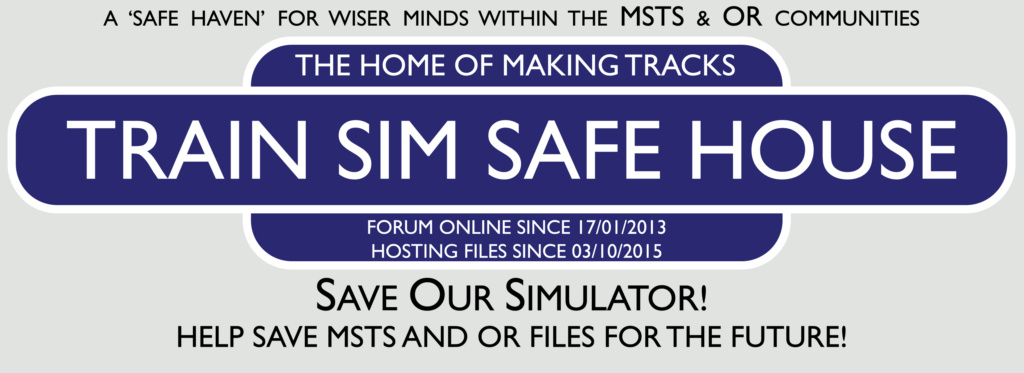Coupling types
2 posters
Page 1 of 1
 Coupling types
Coupling types
I have been going through my stock of BR steam era vehicles trying to ensure that they will couple with each other, as there seems to be a random mix of "chain" and "automatic", plus of course "bar" where appropriate.
However, some of the more recent items have an Openrails folder within the trainset folder and this contains one or more files, usually the same number as there are engine and wagon files in the main folder.
Some, especially the DMU files, have "automatic" as the coupling type in these files. But others, usually steam locomotives, have "spring" where I would expect to see one of the three normal options.
What is the significance of this?
Jonathan
However, some of the more recent items have an Openrails folder within the trainset folder and this contains one or more files, usually the same number as there are engine and wagon files in the main folder.
Some, especially the DMU files, have "automatic" as the coupling type in these files. But others, usually steam locomotives, have "spring" where I would expect to see one of the three normal options.
What is the significance of this?
Jonathan
Jonathan David- Posts : 359
Join date : 2016-08-10
Age : 77
Location : Newtown, Powys
 Re: Coupling types
Re: Coupling types
Hi Jonathan,
I think you're probably mis-reading! 'Spring' is the parameter after Coupling (
As far as I know, there is no such coupling type as spring. Furthermore, I don't think Open Rails complains if you try mixing coupling types.
Cheers,
Ged
I think you're probably mis-reading! 'Spring' is the parameter after Coupling (
As far as I know, there is no such coupling type as spring. Furthermore, I don't think Open Rails complains if you try mixing coupling types.
Cheers,
Ged

Intel i5 4690K (3.5GHz), Gigabyte GA-Z97P-D3 m/b, 12GB RAM, NVIDIA GTX 750ti (2GB), ASUS Xonar DS Sound Card, Win 10 Pro 64 bit.
slipperman12- Posts : 2647
Join date : 2013-01-29
Age : 82
Location : North Nottinghamshire
 Re: Coupling types
Re: Coupling types
Thanks. What confused me is that "spring" appears at the point in the file where in an MSTS file the coupling type appears. For example,
OpenRails
Comment ( Rear Coupler )
Coupling ( Spring ( Stiffness ( 1e4N/m 4.5e6N/m )
Break ( 1200kN 1200kN )
r0 ( 20cm 30cm ) )
CouplingHasRigidConnection ( 1 ))
MSTS
Coupling (
Type ( Bar )
Spring (
Stiffness ( 1e7N/m 1e7N/m )
Damping ( 0.2e7N/m/s 0.2e7N/m/s )
Break ( 1e7N 1e7N )
r0 ( 10cm 1e9 )
) CouplingHasRigidConnection ()
So panic over; not sure why (Rear Coupler) is commented out, though it appears not to affect things anyway.
Just to complicate things, some of the OpenRails files do include the coupler type, especially for DMUs. But again apparently no real affect.
Jonathan
OpenRails
Comment ( Rear Coupler )
Coupling ( Spring ( Stiffness ( 1e4N/m 4.5e6N/m )
Break ( 1200kN 1200kN )
r0 ( 20cm 30cm ) )
CouplingHasRigidConnection ( 1 ))
MSTS
Coupling (
Type ( Bar )
Spring (
Stiffness ( 1e7N/m 1e7N/m )
Damping ( 0.2e7N/m/s 0.2e7N/m/s )
Break ( 1e7N 1e7N )
r0 ( 10cm 1e9 )
) CouplingHasRigidConnection ()
So panic over; not sure why (Rear Coupler) is commented out, though it appears not to affect things anyway.
Just to complicate things, some of the OpenRails files do include the coupler type, especially for DMUs. But again apparently no real affect.
Jonathan
Jonathan David- Posts : 359
Join date : 2016-08-10
Age : 77
Location : Newtown, Powys
Page 1 of 1
Permissions in this forum:
You cannot reply to topics in this forum
 Home
Home